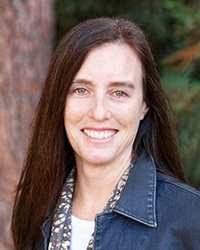Public Health Professor Sees Potential in UC Merced
 From Cuba and New Mexico to Seattle, Nancy Burke has seen firsthand the differences in health care experiences among citizens and refugees from various nationalities and backgrounds.
From Cuba and New Mexico to Seattle, Nancy Burke has seen firsthand the differences in health care experiences among citizens and refugees from various nationalities and backgrounds.
A new public health professor in the School of Social Sciences, Humanities and Arts, Burke brings to UC Merced more than 15 years of research experience, most recently at UC San Francisco. For the past eight years, she has served as co-chair the UC-Cuba Academic Initiative, facilitating collaborations between UC and Cuban scholars.
When asked what drew her to UC Merced, Burke credited the opportunity to build a public health program that values community engagement and a team approach to research, diversity among the students and faculty and a focus on grooming undergraduate students to become researchers themselves.
As someone who has seen the value of using differing approaches to health communication for people of different ethnicities, Burke thinks the field of public health could benefit from increased diversity among its researchers — and UC Merced should be on the forefront of that movement.
“I want this to be a program that can transform the way health research is done, and that comes from changing who does it,” Burke said. “Here at UC Merced we have the potential to attract diverse students who are committed to addressing social inequalities, and to provide them with the training and expertise they need to direct their research in their own unique and creative ways.”
Burke recently took a few minutes out of her busy schedule to answer five questions for Panorama.
What is the focus of your research?
Broadly speaking, my research program focuses on health inequities. Over the last few years, I have developed a strong interest in understanding and addressing health literacy challenges. These challenges span from understanding insurance forms to being empowered to ask questions of providers and expect answers. Right now, I have two funded projects on this topic; one working with Mexican immigrant parents of children 5 and younger on oral health literacy, and another designed to define organizational aspects of health literacy in safety-net hospitals.
What drew you to this field?
My parents taught me to be attentive and responsive to inequality and discrimination — important skills when growing up in the southern United States. I was drawn to anthropology for my graduate work because it offered a way to understand the underlying cultural, historical and social forces informing structural inequalities. My public health colleagues taught me how to combine these ideas with strategies and tools designed to impact inequalities and to create change.
What new projects are you looking forward to in the upcoming year?
I’m very excited about continuing my work with our public health faculty to infuse our graduate curriculum with the principals and practices of team science and community-based research. Our students are learning the value of research teams that include not only scientists from different disciplines, but also community stakeholders who often know the context and understand problems in unique and insightful ways. I see this as not only distinguishing our program, but also as the best way to train researchers with the expertise and skills necessary to address the many health issues of the San Joaquin Valley and beyond.
What are some of the most rewarding things about your job?
One of the reasons I came to UC Merced was the opportunity to work with students and to mentor junior faculty. So far, that has been a great and rewarding piece. I’ve also enjoyed starting to get to know community leaders committed to addressing health challenges in the Valley and exploring possibilities for collaboration with our faculty and students.
Tell us something about you that people might not know.
One of my favorite things is traveling around the country on the train with my two sons. On our last trip, we met a number of people traveling back from Los Angeles to New Orleans after unsuccessful attempts to live there after Hurricane Katrina. We listened to their stories about the storm, their travels since and their hopes for return while the desert landscape rolled by outside the train windows.
